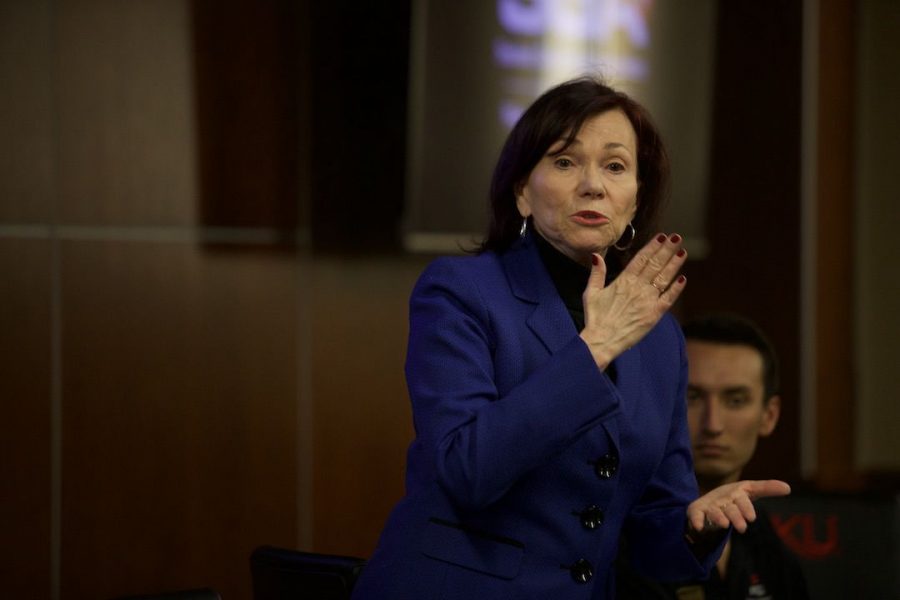Ballman’s resignation and the impact it has on WKU
April 9, 2019
Larry Snyder woke up on March 26 as one of the most experienced deans at WKU, second only to Cheryl Stevens. By the end of that day two weeks ago, that fact would no longer be true.
Less than two weeks after Snyder was asked to resign as dean of Potter College of Arts and Letters by then-Provost Terry Ballman, a whole lot else would also change, leaving WKU’s administration flipped on its head and turned sideways before coming out with a totally new look.
In the days following Snyder’s forced resignation, an outcry of protests and demands for a reason why from faculty, staff and students led to a University Senate vote of no confidence in Ballman on April 4. Before lunchtime of the following day, Ballman was out as provost, announcing her resignation in an email to faculty and staff.
Less than a half hour later, Stevens, who had served as dean of Ogden College of Science and Engineering since 2012, was named acting provost by President Timothy Caboni.
A public vote of no confidence is unprecedented at WKU. Following the vote, WKU released a statement saying that a vote of no confidence is “exceedingly rare in higher education and at our institution.” David Lee, university historian and former provost, said he was “not aware of any action similar to the action the University Senate took” with the vote.
With the Comprehensive Academic Program Evaluation serving as the backdrop, the landscape and future outlook of the university’s leadership has changed drastically at a time when stability and experience are crucial.
University Senate Chair Kirk Atkinson said he sees Ballman’s resignation as a way for WKU to move forward.
“We’re at a crossroads, and we need to be able to move forward,” Atkinson said. “I still have great hopes and trust that we can band together to remain a student-centered and student-focused university.”
On Monday, exactly 13 days after Snyder’s resignation, WKU moved forward, announcing the CAPE Committee’s recommendations to suspend 101 of 380 programs across campus.
Those tasked with answering to the proposed suspensions include four interim deans and an acting provost just days into her new job. The only dean serving on a permanent basis, Corinne Murphy of the College of Education and Behavioral Sciences, is in her eighth month at WKU.
The recommendations for suspension will be presented to the Board of Regents on Friday and include 11 undergraduate degree programs, four graduate degree programs and 86 other programs which award certificates and minors.
An informal survey released to faculty before the University Senate’s special meeting last week also revealed a lack of confidence in Caboni.
Of 365 faculty responses to the survey, which asked about the confidence in Caboni’s leadership, 54.2% of faculty voted it lacked confidence in Caboni (12.3% of respondents abstained from voting yes or no).
In response to the University Senate’s vote of no confidence, which came after the informal faculty survey, Bob Skipper, WKU’s media relations director, issued a statement saying “WKU takes shared governance seriously.”
In Caboni’s email addressing Ballman’s resignation, he said “a vote of no confidence is a powerful statement and one that I take very seriously.”
Beyond the scope of the Hill, the dismissal of Snyder has also resonated on a national level.
On Monday, the top story on Inside Higher Ed, a widely read news site in the academic world, was titled “How not to fire a beloved dean,” and the photo accompanying the story was a portrait of Ballman.
“Like many institutions, Western Kentucky is facing challenges,” the story reads, “including steep state funding cuts. So while the university reviews academic programs with some regularity, the stakes are high this round.”
Now, Ballman will serve as an “assistant to the president for special initiatives” until August 2020, at which point she will become a tenured faculty member in the Department of Modern Languages.
Skipper said Ballman’s role as assistant for special initiatives was new, and he did not know what the roles of the position entailed.
Editor-in-Chief Evan Heichelbech can be reached at 270-745-6011 and [email protected]. Follow Evan Heichelbech on Twitter at @evanheich.


























